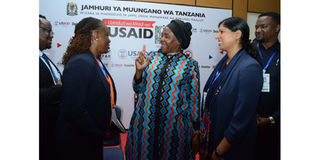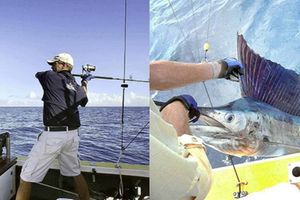Government directs Kizazi Hodari to set up programs for boys

Minister for Community Development, Gender, Women and Special Groups Dorothy Gwajima (Centre) chats with USAID Kizazi Hodari Southern Chief of Party Dorothy Motoyo (left), while Deloitte Consulting Country Director Zahra Nensi looks on during the official launch event of Kizazi Hodari in Dodoma yesterday. PHOTO | HABEL CHIDAWALI
What you need to know:
- Funded by the U.S agency for International Development, Kizazi Hodari aims to protect and improve the health and well-being of orphans and vulnerable children and youth in communities highly impacted by HIV
Dodoma. The government has directed the Kizazi Hodari project to include special programs for preparing boys to become better men in the future.
The US Agency for International Development (USAID) is funding the five-year project which started last year.
The Kizazi Hodari project will help the government to improve health services.
The safety and well-being of youngsters aged 0–17 in communities highly impacted by HIV, as well as orphans and vulnerable children (OVC), are additional components of that effort.
The Evangelical Lutheran Church in Tanzania (ELCT) is carrying out the project in 12 regions throughout the northeastern zone, including Arusha, Dodoma, Kilimanjaro, Mnyara, Morogoro, Singida, and Tanga.
This year, the Kizazi Hodari project will benefit at least 138,944 people in order to carry out the theme of “Strong Generation for a Sustainable Nation.”
Speaking at yesterday’s “Kizazi Hodari” launch ceremony in Dodoma, Minister for Community Development, Gender, Women, and Special Groups Dorothy Gwajima stressed the inclusion of programs to help boys become better men in the future.
“The establishment of such programs for boys, as well as proper education for a child’s upbringing, development, and early development, will be beneficial for Kizazi Hodari project,” according to Dr. Gwajima.
Dr Gwajima’s statement comes at a time when the nation has seen a rise in incidents of violence against children.
Along with advocating for the cooperation of all religions in denouncing the rise in sexual assault incidences, Dr Gwajima also stated that there is a need to step up interventions to combat sexual violence in schools.
She also asked the Kizazi Hodari project to keep up its efforts to supervise children’s counseling in order to deliver comprehensive and long-lasting services and to fortify the community’s service networks for children’s protection and safety.
“The project intends to broaden the reach of detecting children infected with HIV and connecting them to health facilities for treatment,” according to Zahra Nensi, the Resident Director of Deloitte.
“We also want to help increase youth and orphans’ access to resources that will help in preventing and responding in case of violence,” she said.
She added that another objective is to help adolescent girls, guardians of orphans, and those living in precarious circumstances improve their financial situation.
“It is anticipated that the initiative will employ and provide services to at least 90% of the children and young people from the health centers serviced by the United States President’s Emergency Plan to Fight AIDS Relief,” said USAID’s resident director Kate Msomvongsiri.
She claimed that the majority of the young people come from health facilities that are part of the US President’s Emergency Plan to Fight AIDS Relief (PEPFAR).




